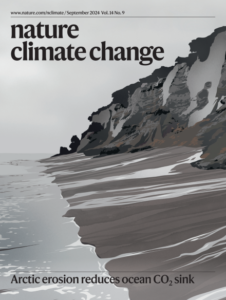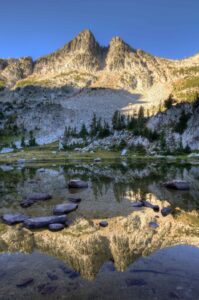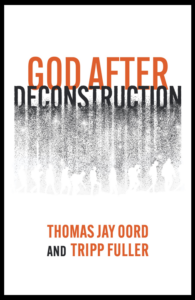God and Climate Change
A few years ago, I wrote an essay saying those who believe God can control creation might care less about fighting climate change. I called the article, “God Can’t Stop Climate Change Singlehandedly” (click title for essay).
An article in the September 2024 issue of Nature supports my earlier claim. The article is titled, “Belief in divine (versus human) control of earth affects perceived threat of climate change.” (click magazine image for essay).
Thinking God is omnipotent affects other pressing matters of science and theology. In our book God After Deconstruction, Tripp Fuller and I address some problems that arise. Here’s an excerpt from one chapter.
Science and Sovereignty
Underlying a literal reading of Genesis and science skepticism (as outlined in the text above), we find beliefs about divine power. We see the consequences of these beliefs, for instance, in how some respond to global warming. “For many evangelicals,” says Janet Kellogg Ray, “suggesting that humans can change the climate is an attack on the sovereignty of God.”[1]
How could this be so?
An omnipotent God has the power to reveal truth unambiguously; we don’t have to search for it using human reason or science. An all-powerful deity could have created the universe in a flash six thousand years ago, without evolution. The Sovereign One alone can decide to spread or contain viruses. Nothing and no one can limit God’s omnipotence, the thinking goes.
Furthermore, this God is like a magician. An all-powerful God can heat or cool the planet singlehandedly, regardless of what people do. This means, as Kellogg Ray put it, “scientists sounding the alarm look like fear mongers who scare little kids with melting ice and sad polar bears.”[2] Creaturely responses to global warming will make no ultimate difference because God can control everything.[3]
If an omnipotent God alone decides everything about life and death, it would be appropriate to wonder why anyone should make sacrifices for the good of the planet. After all, those who recycle aren’t trusting God! As Evangelical pastor John MacArthur puts it, “God intended us to use this planet for the benefit of man. Never was intended to be a permanent planet. It is a disposable planet…we need not repent of the way we have polluted, distorted, and destroyed the Creator’s work.”[4]
In fact, scientific explanations become ultimately unnecessary if God is omnipotent. We can just say, “God did it,” or “God permitted it.” Those who sound more sophisticated might say something like, “creatures are secondary causes accomplishing the will of a Primary Cause.”[5] In other words, we are not real agents with freewill and responsibility: only God is. Nothing we do matters.
Most progressive Christians can identify the problems that arise from denying science and dismissing human agency. And many say they love the earth, believing creatures to be intrinsically valuable. But many of these same people fail to abandon omnipotence, a theological view of God’s power that undermines human agency, the work of science, and creation’s value.
So it’s not just Fundamentalists who need to rethink God in light of science.
Is Scientific Fundamentalism the Alternative?
Some who deconstruct have replaced religious fundamentalism with scientific fundamentalism. They move from whole-hearted trust in religious authorities to whole-hearted trust in the authority of science. At worst, this amounts to switching idols. At best, it’s inadequate. (See my essay, “Christian and Scientific Fundamentalism.”)
Scientific fundamentalists take as their sole authority methods of inquiry and the proposals of some scientists. Chief among them would be the idea that science alone provides truth. (Just like the Bible alone provided truth.) Let’s call this attitude “scientific reductionism.”
But when we limit truth to what the scientific method can assess, essential aspects of human experience get excluded. Science simply does not have tools to assess the truth of free choices, for instance. It can neither affirm nor deny values, including right and wrong, better or worse, attractive or ugly. The scientific method, though useful for many things, cannot account for beauty and goodness, forgiveness and justice, compassion and awe.
Scientific fundamentalists, like religious fundamentalists, reject personal experiences that contradict their rigid and reductionist theories. Take purpose, for example. Scientists act purposefully—they have to, to do science! But the scientific method itself cannot account for purpose in actions. That’s beyond its scope, because that’s about meaning and intention. Ironically, scientific fundamentalists reject purpose in nature, despite being part of nature and acting purposefully!
Some scientific fundamentalists call themselves “New Atheists.” They say they want a world in which cooperation, peace, and well-being reign. Surely those represent goals we all ought to embrace. But they say simplistically that religion is the enemy of those values, just like the Fundamentalists say science is the enemy of truth. Scientific fundamentalism itself provides no real moral or intellectual framework for attaining peace, benevolence, and cooperation, or how to even make sense of those values.
Perhaps the biggest flaw in scientific fundamentalism is its inability to speak plausibly about what’s most important: Love. If love involves freedom, intentionality, and the pursuit of values, but science can’t detect those dimensions of life, scientific fundamentalists must reject the existence and importance of love. Or they will simply reduce it to reproductive success. We can see that science alone remains woefully inadequate as a complete explanation of the diverse experiences making up our world. Despite its powerful use as a tool, it was never meant to explain everything.
To overcome scientific and religious fundamentalisms, we should attend both to our own experience and these diverse experiences in the world. This means, in part, seeking to integrate wisdom in various disciplines, religious traditions, arts, and literature, and putting together multiple forms of knowledge. A wise person appreciates and draws from diverse sources.
We agree with philosopher Alfred North Whitehead when he says, “You cannot shelter theology from science, or science from theology; nor can you shelter either of them from metaphysics, or metaphysics from either of them.”[6] Metaphysics involves asking the highest questions of meaning and existence, something we all intuitively do to varying degrees. We want to give ultimate explanations for our individual and collective experiences. The best explanations consider all facets of existence.
Loving Nature
Many people find great comfort, experiences of joy, and meaning in nature. Embracing God after deconstruction involves thinking differently about nature, science, and God in creation.
Let’s review some common pitfalls we’ve identified. Healthy theology will employ humble and honest approaches to science. It doesn’t think scientists, on the whole, are deceivers. It doesn’t shoehorn contemporary science into ancient cosmologies.
Healthy theologies also don’t go to the opposite extreme and throw the baby out with the bathwater. We shouldn’t regard scientists as inerrant, nor science as the sole arbiter of truth. The scientific enterprise may be an essential endeavor for making sense of life, but it’s not the only one.
So how can we have a healthier, more productive relation to science and the natural world? Because open and relational thinkers take science, theology, and philosophy seriously, they can do generative work in science-and-religion discussions. They’re not afraid to rethink theology in the light of science and philosophy. Or conversely, to rethink science and philosophy in light of religious or lived experience. A healthy adventurer will bring spheres of knowledge together, engaging multiple voices.
Good theologies after deconstruction won’t be afraid to embrace the claim that the universe is ancient and evolutionary processes are at play. We can affirm God has been creating in and through it all, alongside creaturely actors, factors, and forces. Post-deconstruction theologies take the evidence of climate change seriously, and they will explore new ways to live well together. They don’t fear the scientific consensus on matters of public health or other issues, while realizing that no one has the full truth. Even the best explanations may need to be set aside in light of fresh evidence. That’s the core of the scientific method at its best.
Because open and relational theologies don’t think God controls us or creation, they can overcome various problems with thinking an all-powerful God entirely determines creation. Rather, creatures have their own value and agency. Creatures contribute to what occurs; history represents a symbiotic God-creation venture. Open and relational approaches stress that divine power can be understood as uncontrolling love active among the smallest and largest, the least complex and the most, in the miraculous and mundane. We can find a mystic sense of communion and meaning in the entire universe.
Some who have been burned by bad theology can find refuge in nature: many who deconstruct witness nature’s ability to rejuvenate their spiritual sensibilities. The wilderness and forests become sacred spaces. We find a measure of healing when we feel sand in our toes, the wind in our faces, mountain water enveloping our bodies, or the warmth of campfire embers. Taking an afternoon hike or walking along a river brings many closer to God than any Bible verse. Time in nature can be therapeutic.[7] We can find God and ourselves there.
Many in the open and relational community use the term “panentheism” to talk about the God-creation relationship. This word means literally that all (pan) is in (en) God (theism). All creation affects God’s moment-by-moment experience because God is directly present to, influencing, and related to everything and everyone.[8] Rather than being aloof or absent, the idea of panentheism stresses that God is experiential, affected, and present to and within created things.
Panentheism says that while there are differences between Creator and creation, there’s no distance between the two. We’re not the same as God, but neither are we separated from God. We’re all in God’s experience.
When we believe God is present to all and creation has intrinsic value, an ecological awareness can emerge. Healthy theologies after deconstruction will emphasize care for the earth and her creatures, because loving “the least of these” becomes part of fulfilling the biblical commands to love God and neighbors as oneself. We know that the future of the planet and her creatures relies, in part, on our choices.
A healthy theology after deconstruction will stress that life here and now is valuable. We’re not “just passing through,” as if our time on earth was insignificant. We’re not just aiming for heaven after we die. We aim instead not to have our head in the clouds, and be “so heavenly minded that we’re of no earthly good.” Our lives count—this world matters. Whatever we think about the afterlife, we can believe that how we live in the present makes a difference to us, to others, to creation, and to God.
God after deconstruction appreciates science in ways that are helpful, as well as the natural world.
(Special thanks to Dana Hicks for alerting me to this Nature article.)
[1]. Janet Kellogg Ray, The God of Monkey Science: People of Faith in a Modern Scientific World (Grand Rapids, MI: Eerdmans, 2023), 141.
[2]. Ibid.
[3]. For books addressing the climate crisis and living well with creation, see Philip Clayton and Wm. Andrew Schwartz, What is Ecological Civilization? (Process Century, 2019); Jay McDaniel, With Roots and Wings (Eugene, OR: Wipf and Stock, 2009); Randy Woodley, Shalom and the Community of Creation (Grand Rapids, MI: Eerdmans, 2012).
[4]. John MacArthur, “The End of the Universe, Part 2,” Grace to You, September 28, 2008, https://tinyurl.com/rvp4zmck
[5]. The primary/secondary causation view is usually linked with the thought of Thomas Aquinas. For a criticism of it, see Oord, The Death of Omnipotence and Birth of Amipotence, ch. 4.
[6]. Alfred North Whitehead, Religion in the Making (New York: Random House, 1926/1954) 76-77.
[7]. Linda Mercadante reports that for a large number of the “spiritual but not religious” look to nature as the resource for their spirituality, either blended with or in place of specific spiritual alternatives (Belief Without Borders, 88).
[8]. For an introduction to panentheism from open and relational perspectives, see Andrew Davis and Philip Clayton, eds., How I Found God In Everyone and Everything (New York: Monkfish, 2018).





Comments